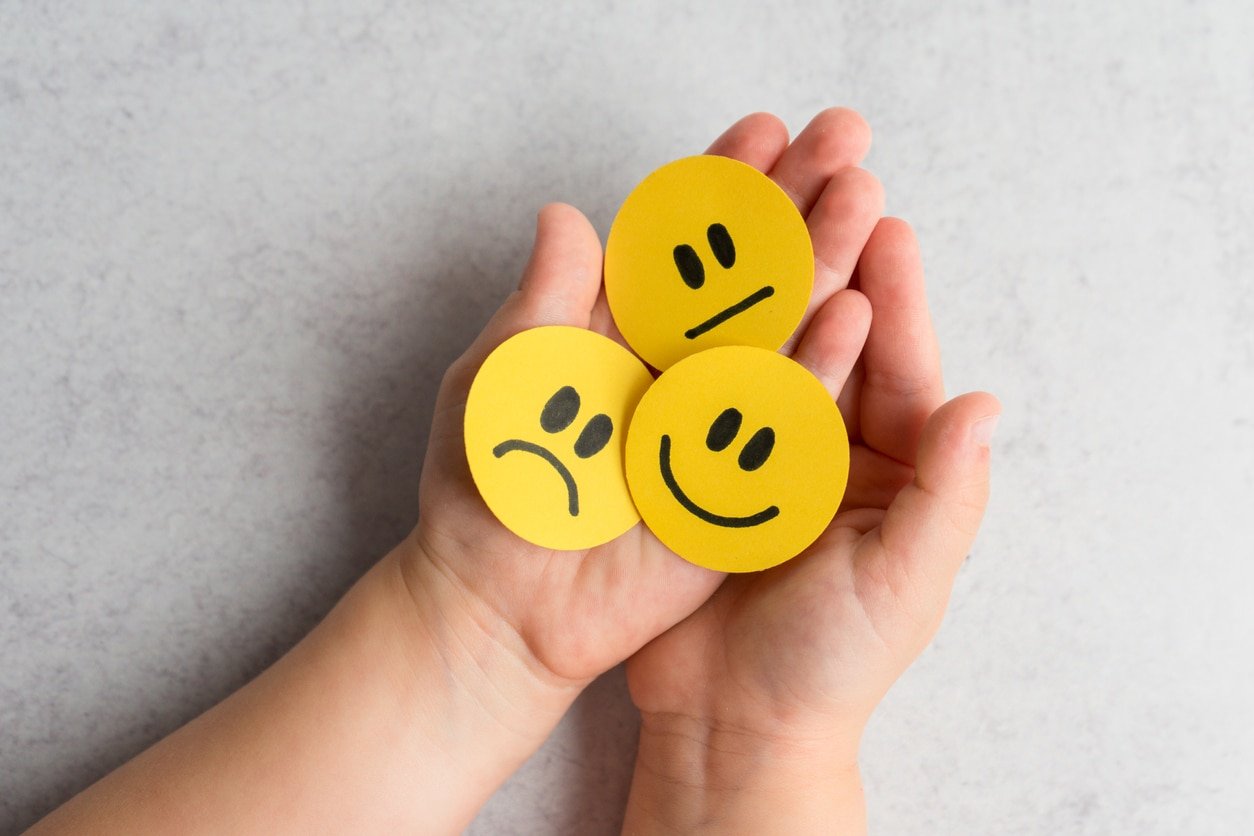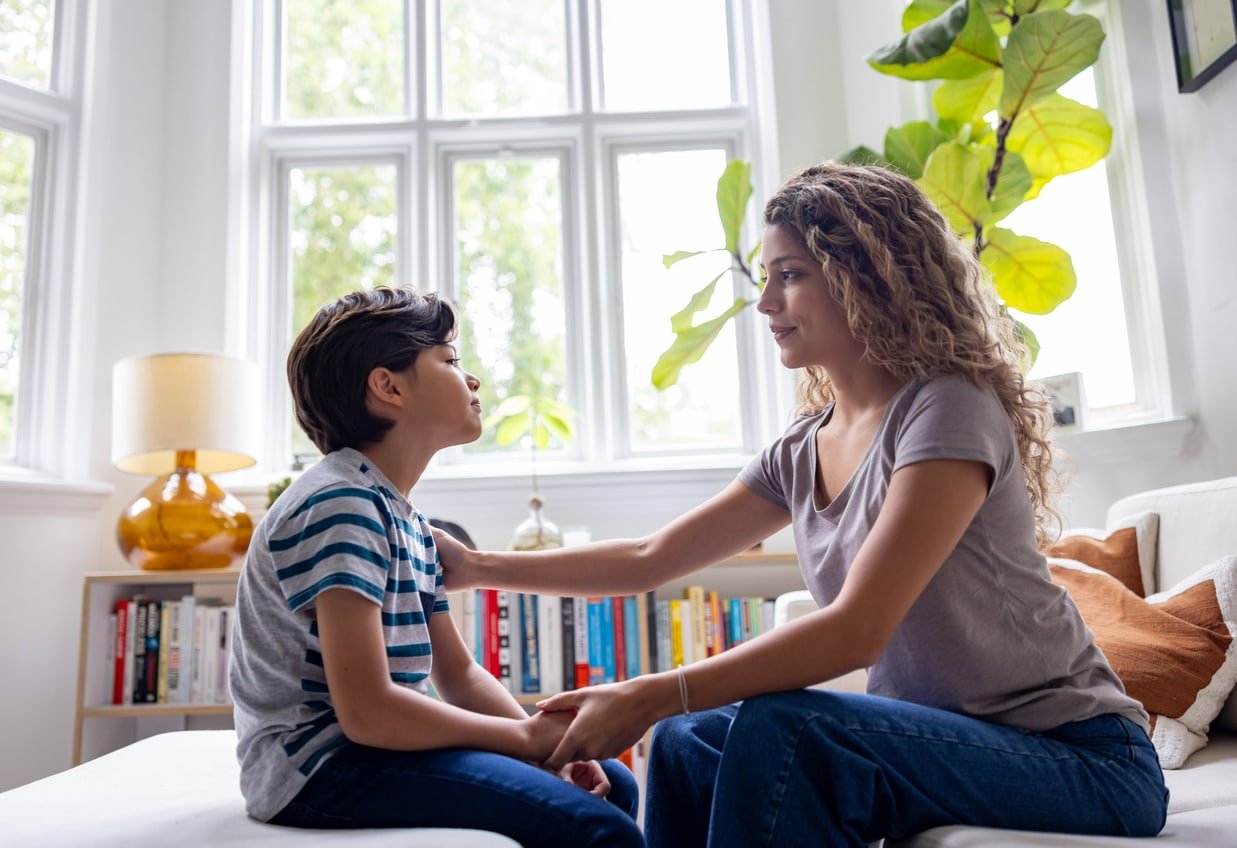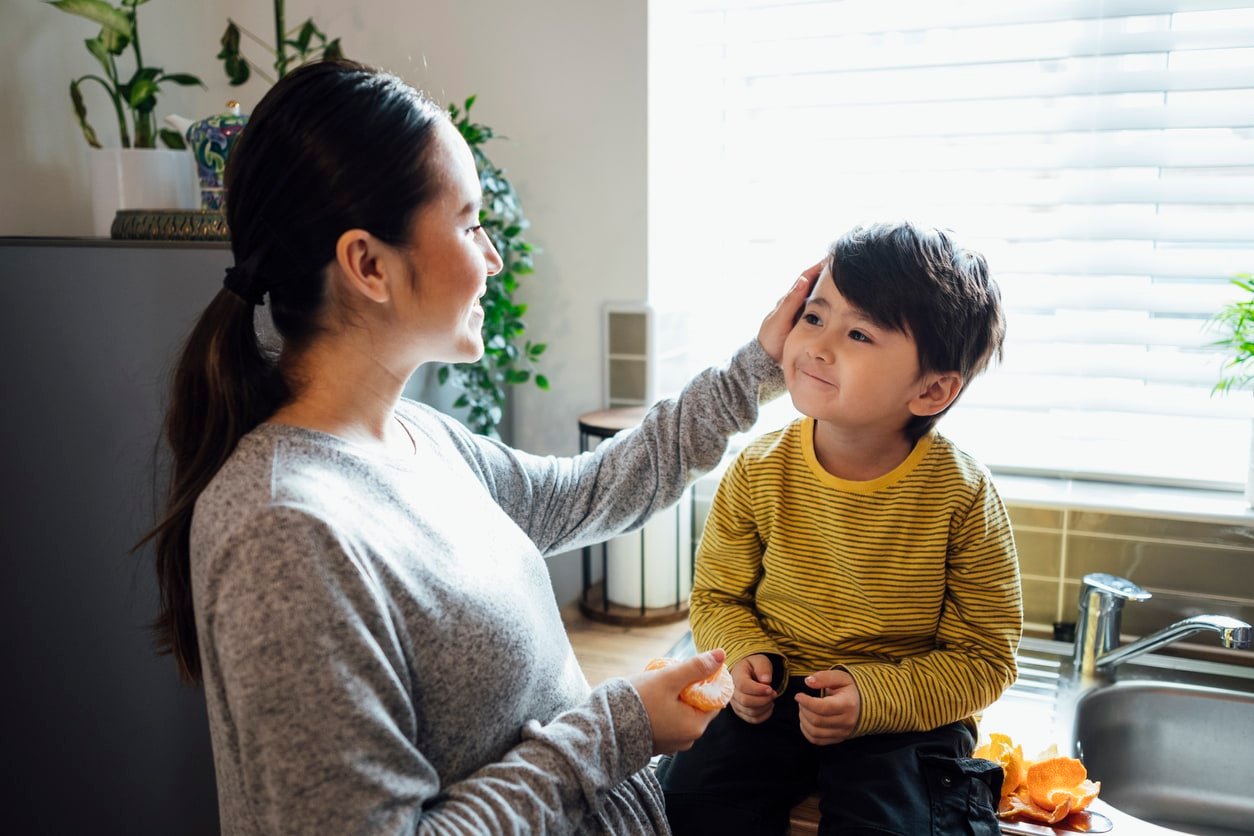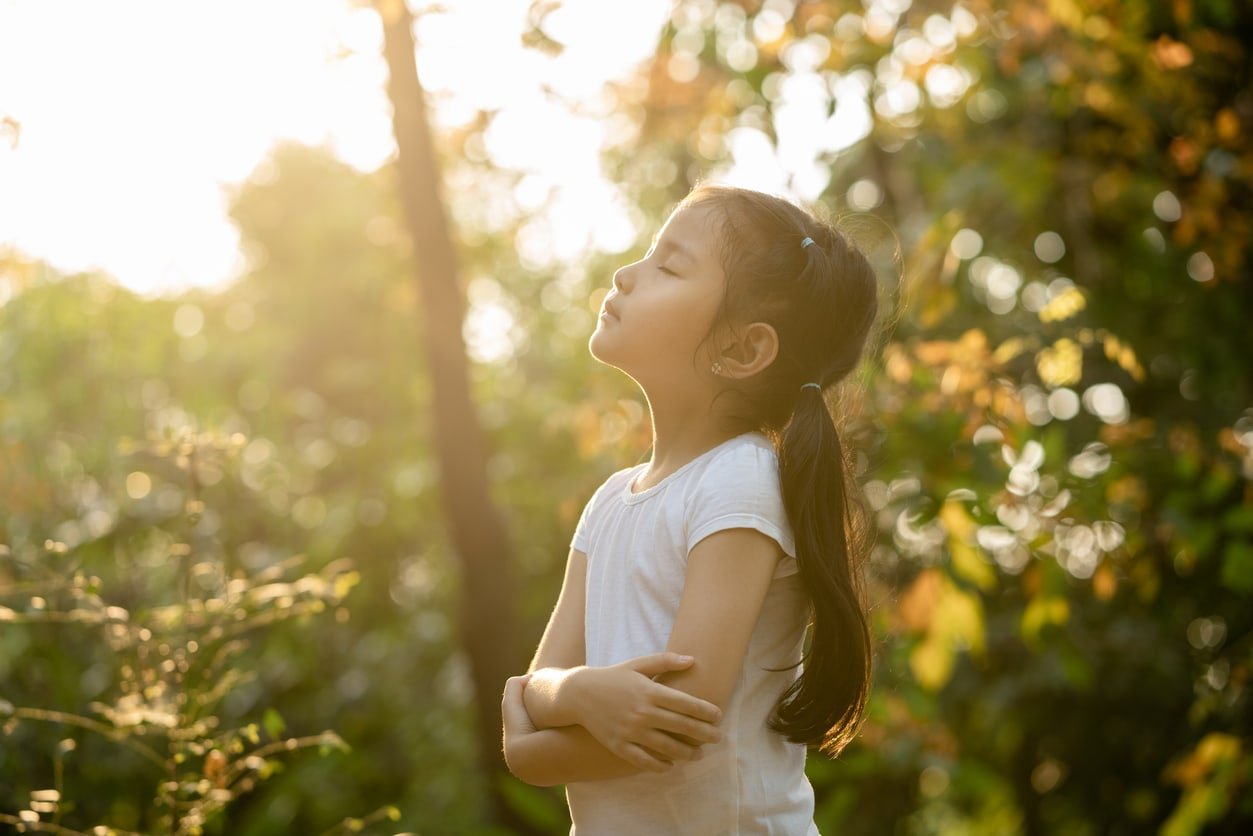It’s normal to feel angry, scared, or sad at times, and as our kids grow and develop, they will experience a whole host of emotions (big ones!). But how do you know what’s normal and when big emotions or certain behaviors are a sign your child needs support? Your child’s mental health is key to their overall development and well-being, as it helps them manage challenges, bounce back from adversity, and develop strong relationships with others. It can ultimately influence their self-esteem and ability to enjoy life.1 So, let’s explore what mental health is, why it matters, how common childhood mental disorders are, and what to look for to ensure your child is developing positive mental health. We’ll also share mental health activities that can be helpful for kids, including book recommendations to help a child with issues like anxiety and depression.
Children’s Mental Health: What It Is and Why It Matters

Childhood mental health awareness is incredibly important. This is because mental health can influence a child’s emotions, behaviors, and overall well-being. It affects how they manage challenges, their relationships, and their decision-making.2 Childhood mental disorders can change the way that a child learns, behaves, and manages their feelings. Any difficulties in these areas can cause distress and impact their ability to participate in “normal” activities like education, childcare, or getting along with family, friends, and the wider community.3
If a child’s mental health isn’t appropriately addressed or treated, it can have significant impacts on their daily functioning now and up into adulthood. Young children who experience mental health concerns are more likely to miss days of school and be suspended or expelled more frequently. These issues can also impact their ability to make (and keep) friends and lead to other mental health disorders or medical conditions in childhood.1 If a child doesn’t learn how to cope with intense or distressing emotions or symptoms, they can develop things like substance use issues as an adult (using drugs or alcohol to cope because they haven’t learned other skills).1
Mental health doesn’t just include the presence of issues, challenges, or disorders — kids can also experience positive mental health in childhood! There are indicators of positive mental health in most children, with some research showing that most parents see their children exhibit things like:4
A child’s positive mental health means they can make friends, learn new things, and think clearly. Therefore, they are more likely to do well in school. They also have higher confidence and self-esteem. Because they are resilient and persevere, they can set goals, make decisions, and manage challenges, and they generally have a positive outlook on life.2

Mental health disorders are relatively common in childhood, with an estimated 15 million young people in the United States having a mental health diagnosis. Nearly 20% of children (aged 3-17) have a developmental, emotional, or behavioral disorder.5,6 Estimates of the most common childhood disorders between the ages of 3 and 17 are:2
- Attention Deficit Hyperactivity Disorder (ADHD) – 9.8%
- Anxiety – 9.4%
- Behavioral issues – 8.9%
- Depression – 4.4%
It’s normal for children to experience periods of upset or overwhelm. They might even have symptoms of mental health diagnoses without actually meeting the criteria for a formal diagnosis. So, how can you tell what’s normal and when to reach out for support from an early childhood mental health professional or consultant? Here are some specific things to watch out for that may indicate your child needs to see a healthcare professional:7
- They are overly emotional or distressed, and it seems out of proportion to the thing making them upset.
- Their eating or sleeping patterns have changed significantly.
- They appear withdrawn from you, their friends, or things they used to enjoy.
- Your child’s worries seem excessive.
- They struggle with confidence or talk negatively about themselves.
- They have trouble controlling their impulses.
- Your child engages in self-destructive behavior.
- They have trouble academically or experience relationship issues (at home or with peers).
- They talk about feeling hopeless, not wanting to be around, or how people wouldn’t notice if they ran away or left.
- Your child talks about or engages in self-harm or injures themselves intentionally.
- In the extreme, they may talk about (or even attempt) suicide.
Although some of this information might seem concerning, there are many activities for kids to support their mental health. Parents can implement these to help improve or prevent certain childhood mental issues or disorders. Here are several tips for nurturing your child’s mental health:

Although more research is needed to identify exactly how diet and mental health interplay with one another, there are some indicators that certain eating patterns (like Mediterranean diets) are associated with better mental health than Western diets (typically high in preservatives, processed foods, etc.).8 Research indicates that a healthy diet can improve mental health, general well-being, and cognitive skills, including performance, memory, and academic performance.16
Another activity that promotes better mental health for kids is exercise. When we move our bodies and exercise, we release feel-good chemicals that help us fight stress and generally improve our mood. You can help combat symptoms of many mental health conditions (like ADHD, depression, anxiety, PTSD, and more) by ensuring your child gets plenty of exercise.9,10,11,12
Getting enough sleep helps people manage their feelings, be more patient, and deal with stress better. This helps them with relationships and school. It can also help reduce the risk of children experiencing certain mental health difficulties later in life.13
The relationship between sleep and mental health conditions is a bit tricky. Sleep can make certain mental health conditions harder to manage, but some diagnoses are also linked to poor sleep. So, it’s a bit of “the chicken or the egg,” and it’s not always clear which comes first. Regardless, ensure your child gets good quality shut-eye to support their mental health and well-being.
4. Nurture Safe and Secure Relationships

Another word for safe and secure relationships is secure attachment. Having a safe and secure bond with a parent or primary caregiver helps protect children’s mental health. This bond means that children feel secure and settled, which allows their nervous system to develop normally. They can more easily explore their world, learn, and develop strong and supportive relationships with others.14
It’s important to consider how to explain mental health to a child. You want to find words that are simple enough but are not so vague that they misunderstand or have to use their imagination to fill in the blanks. As a psychologist, I often explain things to children by saying, “Everyone has feelings, but some people have very big feelings. Or they might have different ways of thinking that can make them feel bad or make it hard for them to do things they like or need to do.” We must talk openly about mental health so we don’t create a culture of fear or stigma. Our children need to feel comfortable enough to come to us if they have concerns in the future.
Reading children’s books that specifically focus on different diagnoses or conditions is a great mental health activity for kids. It allows you to explore or introduce mental health topics to your child, as there are lots of books that can help you tackle topics like anxiety, depression, autism, ADHD, and more. The beauty is that picture books are simple and easy to understand, which may kick off a bigger conversation about mental health. They can even help you figure out how to explain things in kid-friendly language.
Here are some mental health books I recommend for kids:

Even though we hope our kids will come to us if they have a concern, we know that doesn’t always happen. So, help them identify someone they can talk to about the things they might not feel comfortable discussing with you. This could be a favorite aunt, uncle, grandparent, family friend, or someone else you trust (and, more importantly, your child trusts). They can even talk to an early childhood mental health consultant. Your child can go to this safe person if they need support outside the family home.
We love our precious children and want to ensure they are happy and help them avoid challenges and distress. But we also shouldn’t go too far. If you rush in to fix things instead of giving your child a chance to, this tells them that you don’t trust them. It also tells them you, the parent, can do it better than them. They miss the opportunity to practice resilience and develop the problem-solving skills they need to keep persisting. These skills will help them manage their mental health and well-being, so don’t deprive them of the opportunity to do things for themselves that are developmentally appropriate and safe (even if it is well-meaning).15
Similar to the above point, we don’t want to rush our kids’ emotions (saying “You’ll be okay” or “It’s not that bad,” for instance). If we do this, we accidentally tell them their emotions aren’t important, and they may be less likely to confide in us. Or, it can teach our children to avoid emotions, and they may develop some unhealthy behaviors to avoid their feelings, like outbursts, denial, emotional dysregulation, or even substance use issues in later life.15 Being able to notice their feelings and respond to them appropriately can help you address or reduce many mental health concerns.

Our children need to know how to identify and manage a whole range of emotions. This will improve their confidence because they can manage distress or cope with big feelings. It also improves their general well-being because they can find the right tools to address the feelings they’re experiencing and cope better with life’s ups and downs.15 Some emotional regulation activities that can help kids with their mental health include:
- Naming feelings for them
- Teaching them relaxation strategies
- Showing them how to blow off steam in healthy ways
If your child can problem-solve, they can navigate life’s challenges and cope when things get tough. Ensure that when problems arise, your child learns how to break them up into smaller (easier) chunks to manage. Identify their strengths so they know what skills they can use to manage situations or challenges that arise. And teach them to ask for help if needed.
12. Model Emotions and Behaviors
Show them how it’s done! I’m not saying to make your child fully aware of your own mental health challenges or well-being, but it’s important that they see you experiencing a wide range of emotions and cope with them. Show them that feelings are okay, and demonstrate how you cope with and manage them. This will go a long way because our kids look to us to see how to handle things, even if we aren’t intentionally trying to teach them anything.17

Teaching self-care is an excellent activity to help your kid’s mental health. It’s important that children learn the value of self-care and prioritize their well-being. Learning about self-care helps kids tune into their physical and emotional needs. It also equips them with the skills to take care of those needs. If they practice as children, it will help them develop healthy habits that will follow them into adulthood.
Praise your child — but it has to be the right kind of praise. Things like “Good boy” or “Good girl” lack meaning. You need to share specific things about your child’s behavior that you have noticed and appreciated. Even better, focus on praising their efforts, not the outcome. We don’t want our children to develop self-esteem that hinges on other people’s praise. When our children feel capable and good about themselves, their self-esteem improves.15
Every day, let your child know that it doesn’t matter who they are or what they do . . . you love them regardless. Let them follow their interests, give them choices (when safe and appropriate), respect their boundaries, show genuine interest in them, etc. These types of actions go a long way toward developing a secure bond with your child. If they trust that you love them regardless, they will be more likely to open up and explore challenges and difficulties with you, both of which can support their mental health and well-being.
Your child might display one or several behaviors explored in this article or be doing something I haven’t touched on. However, the main thing to consider is whether their actions or attitudes significantly differ from their usual functioning, causing them distress or impacting their ability to manage their daily life. If your parental instincts tell you something is up, and you think they may be struggling with a mental disorder, speak to an early childhood mental health consultant. They can help determine if your child’s behavior is normal (developmentally) or if they may need additional support.
